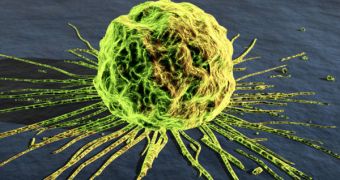PARP is the name experts gave a cell repair enzyme, which is responsible for ensuring that cells don't die when harm comes to them from the outside. While this is generally a good thing, it quickly turns into a bad one when the cells they are protecting are cancerous. Now, scientists have developed a new type of PARP inhibitor, which showed great promise in human tests. The new substance managed to reduce aggressive and otherwise difficult to treat cancers by as much as a third, in women with the most severe form of breast cancer.
The results for the new inhibitor are only in mid-stage, but they already show great promise for the millions of women suffering from this condition worldwide. The version of the drug created by BiPar Sciences Inc. improved survivability by more than 60 percent, as opposed to chemotherapy alone. The kind developed by AstraZeneca Plc was used as a standalone treatment in women with advanced breast cancer related to gene mutations, and proved that it could reduce tumors in 30 percent of patients.
“While still very preliminary, these are some of the most exciting results we have seen in a long time," Reuters quotes Boston's Dana-Farber Cancer Center breast cancer chief Dr. Eric Winer as saying. The “poly (ADP-ribose) polymerase” (PARP) is what cancer cells use to repair the damage they inflict on the DNA of the cells they destroy, and also to repair the effects of chemotherapy on the genetic material. If the substance no longer exists or functions, then it would stand to reason that the tumors will have no way of fighting damage.
As side effects, the experts mentioned nausea, fatigue and vomiting, which are about the same with those caused by chemotherapy. However, when it comes to efficiency, using the PARP inhibitor allows for a mean life time of 9.1 months in women with extremely aggressive forms of breast cancer, while chemotherapy only prolongs life with 5 or so months. Additionally, “some of these responses were extremely durable and a number of patients continue on treatment beyond one year of therapy,” added the medical science director at AstraZeneca, James Carmichael.

 14 DAY TRIAL //
14 DAY TRIAL //